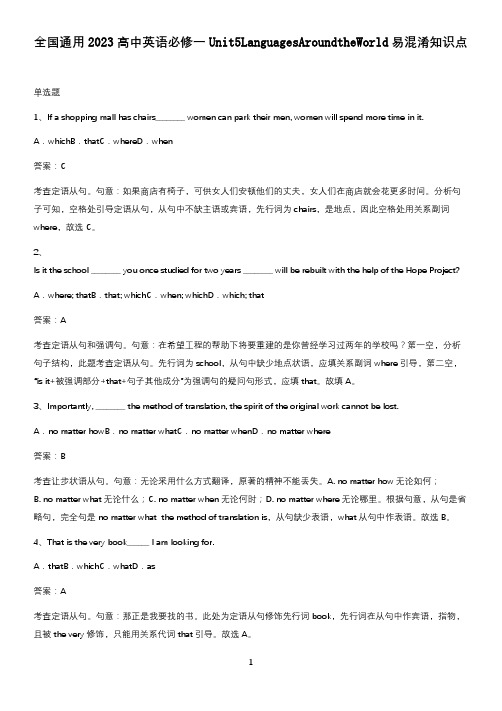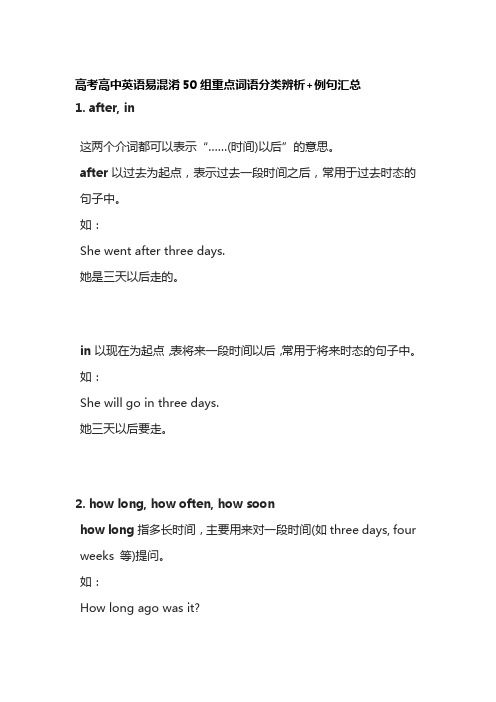高中英语易混淆知识点
- 格式:doc
- 大小:51.50 KB
- 文档页数:7

全国通用2023高中英语必修一Unit5LanguagesAroundtheWorld易混淆知识点单选题1、If a shopping mall has chairs________ women can park their men, women will spend more time in it. A.whichB.thatC.whereD.when答案:C考查定语从句。
句意:如果商店有椅子,可供女人们安顿他们的丈夫,女人们在商店就会花更多时间。
分析句子可知,空格处引导定语从句,从句中不缺主语或宾语,先行词为chairs,是地点,因此空格处用关系副词where,故选C。
2、Is it the school ________ you once studied for two years ________ will be rebuilt with the help of the Hope Project? A.where; thatB.that; whichC.when; whichD.which; that答案:A考查定语从句和强调句。
句意:在希望工程的帮助下将要重建的是你曾经学习过两年的学校吗?第一空,分析句子结构,此题考查定语从句。
先行词为school,从句中缺少地点状语,应填关系副词where引导,第二空,“is it+被强调部分+that+句子其他成分”为强调句的疑问句形式,应填that。
故填A。
3、Importantly, ________ the method of translation, the spirit of the original work cannot be lost.A.no matter howB.no matter whatC.no matter whenD.no matter where答案:B考查让步状语从句。
句意:无论采用什么方式翻译,原著的精神不能丢失。

高考常见易混、易错词汇必记一:名词及名词词组1. amount, number构成短语a number of 修饰可数名词复数;a great amount of 和amounts 修饰不可数名词。
且amounts of 修饰名词作主语,谓语动词用复数。
e.g. a number of students/the amount of money.2. population, people population (一个国家和地区的)总人口;the people 人民;people 具体的人。
e.g. China has a large population.3. work, job 二者均指工作。
work 为不可数名词,job 为可数名词。
e.g. a good job.4. couple, pair couple 指人或动物,pair 指由两部分组成的东西。
e.g. a pair of trousers.5. cook, cookercook 厨师,cooker 厨具。
e.g. He is a good cook.6. police, policemanpolice 警察的总称,后接谓语动词复数;policeman 指某个具体的警察。
e.g. The police are questioning everyone in the house.7. problem, question problem 问题、困难,多与think about ,solve ,raise 连用;question 疑问,多与ask,answer 连用。
8. the doctor and teacher, the doctor and the teacher the doctor and teacher 指一个人,既是医生又是老师;the doctor and the teacher 两个人,一个医生和一个老师。
9. the people, a people the people 人民;a people 名族。

高考高中英语易混淆50组重点词语分类辨析+例句汇总1. after, in这两个介词都可以表示“……(时间)以后”的意思。
after以过去为起点,表示过去一段时间之后,常用于过去时态的句子中。
如:She went after three days.她是三天以后走的。
in以现在为起点,表将来一段时间以后,常用于将来时态的句子中。
如:She will go in three days.她三天以后要走。
2. how long, how often, how soonhow long指多长时间,主要用来对一段时间(如three days, four weeks 等)提问。
如:How long ago was it?这是多久前的事了?how often指每隔多久,主要用来对频率副词或状语(如once a week等)提问。
如:—How often does he come here? —Once a month.他(每隔)多久来一次?每月一次?how soon指再过多久,主要用来对表示将来的一段时间(in an hour, in two weeks 等)提问。
如:How soon can you come?你多快能赶来?3. few, a few, little, a little, several, somefew 和little的意思是否定的,表示“很少”或“几乎没有”;而a few和a little的意思是肯定的,表示“有一些,有一点儿”。
few 和a few修饰可数名词;little 和a little 修饰不可数名词。
several用于修饰可数名词,语意比a few和some更肯定,含有“好几个”的意思。
some可修饰可数名词,也可修饰不可数名词,从数量上说,它有时相当于a few 或a little,有时指更多一些的数量。
4. the other, anotherthe other指两个人或事物中的“另一个”,表示特指。

高考英语高频易错易混词汇一、单复数同形单词1.sheep—sheep 绵羊2.Chinese—Chinese 中国人3.means—means 方式;方法4.series—series 系列5.species—species 物种;种类6.deer—deer 鹿二、有无s意义不同的单词(左侧为不可数名词,右侧+s后变意)1.manner态度—manners 礼貌2.interest兴趣—interests利益3.good益处—goods 货物4.force力量—forces军队5.work 工作—works 著作;工厂6.arm 手臂—arms 武器7.water 水-waters 水域8.paper 纸—-papers 试卷;文件9.exercise锻炼、运动—exercises练习10.spirit精神—in high spirits情绪高11.time时间—times时代、次数、倍数12.direction方向—directions 说明书13.instruction 指令-instructions 说明书14.wood木头—woods 树林15.congratulation 祝贺—congratulations 祝贺;贺词16.fruit水果—fruits几种水果17.sand沙子—sands沙滩18.chicken鸡肉—chickens小鸡1.loud出声地—loudly吵闹地2.close adv.近地(具体)—closely adv.仔细地,密切地(抽象)。
te迟—lately最近4.wide adv.宽地(具体)—widely adv.广泛地(抽象)5.sharp adv.正,指时刻;锋利的—sharply锐利地6.hard adv.努力地,(雨、雪)猛烈地 adj.困难的—hardly adv.几乎不7.free免费地;免费的;空闲的—freely自由地8.high adv.高地(具体)—highly adv.高度地,非常,极为赞许地(抽象)9.deep adv.深地(具体)—deeply adv.深深地(抽象)te adv.迟,晚 adj.迟的,晚的—lately adv.最近—later adv.后来adj.后来的,“时间段+later”久后,later on后来,sooner or later迟早—latest adj.最近的,最新的。

高考英语易混词辨析1.forgettable易被忘记的forgetful健忘的2.valueless无价值的invaluable非常贵重的3.economic有关经济的economical省钱的4.creation创造creativity创造力5.physician内科医生physicist物理学家6.comparable比得上的comparative相对的7.ashamed感到羞耻的/惭愧的shameful可耻的8.confident有信心的confidential秘密的9.disability缺陷,障碍inability无能,不能10.objection反对objectivity客观性11.worthless不值钱的priceless无价的12.impress留下印象impressive令人赞叹的13.response反应,回应responsible负责任的14.faith信心faithful忠诚的15.respect尊敬respective各自的,分别的16.occasion场合occasional偶尔的17.title标题entitle给予……权利18.reward奖励rewarding值得做的,高酬的19.found建立foundation基础,基金会20.drama戏剧dramatic突然的,戏剧般的21.trick花招tricky难对付的22.promise答应,预示promising有前途的23.invite邀请,招致inviting诱人的24.affect (v.)影响affection慈爱25.creation创造recreation娱乐26.promise许诺compromise妥协,让步27.temporary暂时的contemporary当代的28.present礼物;目前的represent代表29.strict严格的restrict限制30.science科学conscience良心31.knowledge知识acknowledge承认32.allow允许allowance津贴33.bowl碗bowling保龄球运动34.instant瞬间instance例子35.search搜查research研究36.sweat汗水,出汗sweet 甜的sweater毛衣37.appointment任命,约定disappointment失望38.stock股票,库存stocking长筒袜39.short短的shortly不久40.inform通知informal非正式的十二、易混词辨析41.easy容易的uneasy不安的;焦虑的41.ensure保证insure投保assure向……保证42.submit提交summit峰会,山峰43.initial最初的essential必不可少的44.contest竞赛context上下文45.pray祈祷spray喷射46.construct建造(v.) instruct指导,指令(v.)47.watch手表,观看match比赛48.succeed成功(v.) success成功(n.)49.image图形,形象,声誉imagine想象50.royal皇室的,高贵的loyal忠诚的51.steal偷steel钢52.access通道assess评价53.pocket口袋packet包54.relieve缓解believe相信55.relief宽慰belief信仰56.bridge桥fridge冰箱57.award奖品reward奖赏58.previous先前的precious宝贵的59.incident事件accident意外60.population人口pollution污染61.invent发明(v.)invest投资(v.)62.respond to对……做出回应correspond to与……一致63.statue雕像status地位,声誉64.source来源resource资源65.surrounding周围的(adj.) surroundings周围环境(n.)66.cure治愈curse诅咒67.sympathy同情(n.) symphony交响曲68.floor地板flour面粉69.college学院colleague同事70.design设计resign辞职71.medal勋章model模型,模特72.elect选举,推选select选择73.patent专利patient病人;有耐心的74.metal金属mental精神上的75.attitude态度altitude海拔76.desert沙漠,遗弃(v.) dessert甜点77.director负责人directory名录78.composition作文,作曲competition比赛79.together一起altogether总共80.consumption消费assumption假设81.apartment公寓套房department部门,大学的系、科82.institution协会constitution宪法,构造83.wonder奇迹,想知道(v.) wander闲逛,徘徊84.explain解释complain投诉,埋怨85.critic批评家critical批评的,至关重要的86.lesson课,教训lessen减少87.band乐队brand品牌,商标88.addition加,增加物addiction入迷,瘾89.import进口export出口90.adapt适应adopt采纳,收养91.tune调子,旋律tone腔调,音调,色调,风格92.section部分,部门,分支session会议,学期93.distribute分配,分发contribute做贡献,促成94.soup汤soap肥皂95.region地区religion宗教96.mount山峰;攀登(v.)amount数量97.personnel人事personal个人的98.nature自然mature (谷物、时机)成熟的99.headline标题deadline截止日期100.leather皮革feather羽毛101.describe描述subscribe订阅,同意102.cease停止tease取笑103.eagle鹰angel 天使angle角度104.contact接触contract合同105.evaluation评价evolution进化106.tension紧张extension延伸,扩大107.distance距离instance例子108.point指向;点appoint任命109.construction建造destruction毁坏120.constitute构成,组成(vt.) substitute替代物;替代(v.)121.tough 坚硬的,棘手的rough粗糙的,粗野的,天气恶劣的122.scare吓唬scarce罕见的,缺乏的123.passage短文,走廊,通道passenger乘客124.include包括(vt.)exclude不包括,排斥(vt.)125.enquire询问acquire获得126.cover覆盖,报道uncover移去盖子recover康复discover发现127.though尽管thought思考through穿过thorough彻底的128.late晚的lately最近later后来 latter后者latest最新的129.deserve值得preserve保护conserve保护reserve保护区;预定(v.)130.broad宽阔的board板;董事会abroad在海外 aboard在飞机/汽车/轮船上131.except除了expect期望respect尊敬inspect视察132.live adj.现场直播的,活的living adj.活着的;健在的,在使用的alive adj.活着的,有活力的lively adj.生气勃勃的133.sensible adj明智的,合理的sensitive adj.敏感的,灵敏的,体贴的134.special adj.特别的,专用的particular adj.专指的,格外的specific adj.明确的,特定的135.effective adj.有效的,实际的efficient adj.效率高的137.rough adj.粗糙的,粗略的,粗暴的tough adj.艰难的,坚强的138.continual adj.连续的,频繁的continuous adj.连续的(指从不间断的) 139.considerable adj.相当多(或大、重要等)的considerate adj.体谅的,考虑周到的140.respectable adj.值得尊敬的,相当好的respectful adj.尊敬的,表示敬意的respected adj.受尊敬的respective adj.分别的,各自的141.likely adj.可能的likable adj.可爱的dislike v.不喜欢alike adj.相似的unlike adj.不同的142.quantity n.数量quality n.质量143.camp n.宿营champion n.冠军campaign n.运动campus n.(大学、学院的)校园144.bank n.银行,库,河畔band n.乐队bond n.关系brand n.品牌145.ash n.灰烬cash n.现金146.sigh v.& n.叹气signal n.信号 v.发信号,表明sign n.标志,迹象v.签署147.flight n.航班,飞行fright n.害怕frighten v.使惊吓fight v.&n.打架,打仗148.advance v.& n.前进,进步adventure n.冒险advantage n.优点149.biology n.生物,生物学biography n.传记150.lie→lay→lain→lying躺,位于lie→lied→lied→lying撒谎lay→laid→laid→laying下(蛋),产(卵),安放,搁delay→delayed→delayed→delaying推迟151.star n.星stare v.凝视starve v.(使)挨饿152.explain v.解释complain v.抱怨plain n.平原adj.平凡的,极普通的153.offend v.冒犯defend v.防御154.rise v.上升raise v.提升,饲养arise v.产生praise v.表扬arouse v.激起155.amaze v.使惊奇amuse v.(使)娱乐156.attract v.吸引attack v.攻击157.effect n.影响affect v.影响(主要指一时的影响,着重影响的动作,可指一般意义的影响,也可指不良影响) influence v.& n.影响(主要指对行为、性格、观点等产生间接的或潜移默化的影响)。

高中英语易混淆词汇 Revised at 2 pm on December 25, 2020.高中英语易混易错词汇高中英语易混易错词汇总结(一)1. clothes, cloth, clothingclothes统指各种衣服,谓语动词永远是复数, cloth指布,为不可数名词 clothing 服装的总称,指一件衣服用a piece of, an article of2. incident, accidentincident指小事件, accident指不幸的事故He was killed in the accident.3. amount, numberamount后接不可数名词, number后接可数名词 a number of students4. family, house, homehome 家,包括住处和家人,house房子,住宅,family家庭成员. My family is a happy one.5. sound, voice, noisesound自然界各种各样的声音,voice人的嗓音,noise噪音I hate the loud noise outside.6. photo, picture, drawingphoto用照相机拍摄的照片,picture可指相片,图片,电影片,drawing画的画 Let's go and see a good picture.7. vocabulary, wordvocabulary词汇,一个人拥有的单词量,word具体的单词He has a large vocabulary.8. population, peoplepopulation人口,人数,people具体的人 China has a large population.9. weather, climateweather一天内具体的天气状况,climate长期的气候状况 The climate here is not good for you.10. road, street, path, wayroad具体的公路,马路,street街道,path小路,小径,way道路,途径take this road; in the street, show me the way to the museum.11. course, subjectcourse课程(可包括多门科目),subject科目(具体的学科)a summer course12. custom, habitcustom传统风俗,习俗,也可指生活习惯,后接to do, habit生活习惯,习惯成自然,后接of doing. I've got the habit of drinking a lot.13. cause, reasoncause 指造成某一事实或现象的直接原因,后接of sth./doing sth,reason用来解释某种现象或结果的理由,后接for sth./doing sth. the reason for being late14. exercise, exercises, practiceexercise运动,锻炼(不可数),exercises练习(可数),practice(反复做的)练习 Practice makes perfect. 15. class, lesson作"课"解时,两者可以替换.指课文用lesson. 指班级或全体学生用class. lesson 6; class 516. speech, talk, lecturespeech指在公共场所所做的经过准备的较正式的演说,talk日常生活中的一般的谈话,讲话,lecture学术性的演讲,讲课 a series of lecture on...17. officer, official officer部队的军官,official政府官员 an army officer18. work, job二者均指工作。
高中英语易混易错词汇辨析大全高中英语易混易错词汇整理1. in a word, in wordsin a word总之,一句话, in words口头上 In a word, you are right.2. in place of, in the place ofin place of代替,in the place of在…地方 A new building is built in the place of the old one.3. in secret, in the secretin secret秘密地,暗自地,偷偷地,一般用作状语;in the secret知道内情,知道秘密,一般用作表语My mother was in the secret from the beginning.4. a girl, one girla girl可泛指所有女孩, one girl一个女孩 Can one girl carry such a big box?5. take a chair, take the chairtake a chair相当于sit down坐下,take the chair开始开会6. go to sea, by sea, by the seago to sea当海员,出航,by sea乘船,由海路, by the sea在海边 go by sea7. the doctor and teacher, the doctor and the teacherthe doctor and teacher指一个人,既是医生又是老师,thedoctor and the teacher两个人,一个医生和一个老师the doctor and teacher is8. in office, in the officein office在职的,in the office在办公室里 He is in office, not out of office.9. in bed, on the bedin bed卧在床上,on the bed在床上 The book is on the bed. He is ill in bed.10. in charge of, in the charge ofin charge of管理,负责照料, in the charge of由……照料 He is in charge of the matter. The matter is in the charge of her.11. in class, in the classin class在课上,in the class在班级里 He is the best student in the class.12. on fire, on the fireon fire**,on the fire在火上 Put the food on the fire. The house is on fire.13. out of question, out of the questionout of question毫无疑问的,out of the question不可能的14. a second, the seconda second又一,再一,the second第…… He won the sec ond prize.15. by day, by the dayby day白天,by the day按天计算 The workers are paid by the day.16. the people, a peoplethe people指人,a people指民族The Chinese is a peace-loving people.17. it, oneit同一物体,one同类不同一 I lost my pen. I have to buy a new one.18. that, thisthat指代上文所提到的,this导出下文所要说的 I was ill. That's why…19. none, nothing, no onenone强调有多少,nothing, no one强调有没有,nothing指物,no one指人--- How many…/How much…? --- None.20. anyone, any oneanyone指人,不能接of,any one指人物均可,可接of any one of you21. who, whatwho指姓名或关系,what指职业或地位 What is your dad? He is a teacher.22. what, whichwhat的选择基础是无**的,which在一定范围内进行选择 Whichdo you prefer, bananas or apples?23. other, anotherother后接名词复数,another后接名词单数other students, another student24. not a little, not a bitnot a little非常,not a bit一点也不 I'm not a bit tired. 我一点儿也不累。
全国通用2023高中英语必修一Unit4NaturalDisasters易混淆知识点单选题1、We study in a classroom ______ windows face to the south.A.whoseB.whichC.whereD.that答案:A考查定语从句。
句意:我们在一间窗户朝南的教室里学习。
本句考查定语从句,先行词为a classroom,关系词在从句中充当定语成分,表示the classroom's,应用whose。
故选A项。
2、Matter is anything ______.A.that take up space and have weightB.which take up space and have weightC.that takes up space and has weightD.those take up space and have weight答案:C考查定语从句。
句意:物质是任何占据空间并有重量的东西。
分析句子结构可知,anything后跟定语从句,anything是不定代词,其后的关系代词只能用that不能用which,因此排除选项B和D,that指代先行词anything,是不定代词,由is可知,句子时态是一般现在时,因此其后谓语动词用第三人称单数,因此空格处是that takes up space and has weight,故选C。
3、When people talk about the cities of the U.S., the first________comes into mind is New York. A.oneB.thatC.whichD.of them答案:B考查定语从句。
句意:当人们谈论美国的城市时,首先想到的是纽约。
A.one 一个;B.that 那个;C. which 那个;D. of them 他们的。
高中英语一般过去时时态易混淆知识点单选题(经典例题高频考点-名师出品必属精品)1、—You know quite a lot about the new movie.—Well, Anna ______ it to me during break.A.introducesB.introducedC.had introducedD.will introduce答案:B解析:考查时态。
句意:—你对这部新电影很了解。
—是安娜在课间休息时介绍给我的。
该句时间状语为during break。
根据语境可知,该时间状语表示一个过去的时间状语,因此该句应用一般过去时态。
故选B。
小提示:对于有明显时间状语的句子,可以根据时间状语来判断句子时态。
例如:ten years ago,last year等是一般过去时态的典型标志。
so far,since,in the past ten years等是现在完成时态的标志。
在此题中,考生根据时间状语during break判断出该题应用一般过去时态。
2、—Have you ever been to London?—Of course. Actually, I ______ there for six years but now I live in Gaozhou.A.workedB.was workingC.would workD.have worked答案:A解析:考查时态。
句意:——你去过伦敦吗?——当然。
事实上,我在那里工作了六年,但是我现在住在高州。
由空后“but now I live in Gaozhou”可知,空处谓语动词需用一般过去时,表示过去发生的事情,前后形成对比。
故选A。
3、-I was afraid I would miss the important lecture.-Oh, was that why you _______asking me to speed up?A.had keptB.are keepingC.would keepD.kept答案:D解析:考查一般过去时。
人教版高中英语过去进行时时态易混淆知识点单选题1、Good heavens! There you are! We _____ anxious about you, and we _____ you back throughout the night. A.are; expectB.were; had expectedC.have been;were expectingD.are; were expecting答案:C解析:考查时态。
句意:我的天啊!你在这里啊!我们一直很担心你的,整个晚上我们一直都在期待着你回来。
第一空表示过去发生的事情持续到了现在,应用现在完成时;第二空根据句意说明是在过去的一段时间里,一直发生的事情,故使用过去进行时。
故C正确。
2、I wasn’t sure if he was really interested or if he polite.A.was just beingB.will just beC.had just beenD.would just be答案:A解析:考查动词时态。
句意:我不敢确定他是真的感兴趣还是仅仅是在表示一下礼貌。
根据前文I wasn’t sure if he was…及并列连词or来判断,此处应为过去时,故排除B项;本句并不表示“过去的过去”,也不表达“过去的将来”,故排除C、D两项;本句表示暂时的情况,故用过去进行时态。
故选A。
3、The telephone _______, but by the time I got indoors, it stopped.A.had rungB.was ringingC.ringsD.has rung答案:B解析:从句子后部分by the time I got indoors可知电话响是发生在我进屋那一时刻,故用过去进行时。
4、Charlie's wheelchair ______ out of power. He drove it into my office and looked for a place to charge it. A.runB.have runC.had runD.was running答案:D解析:考查动词时态。
一.before与until的区别联系实际上,只要我们把握住两者使用时本身的含义及主句动词是终止性的,还是延续性的,肯定式,还是否定式两大点,就能容易地解决这类问题.现详细阐明如下:一、在下列情况下,两者可互换用,但含义略有不同.before表示“在……之前”的意思,强调时间先后关系;而until表示“直到……才”的意思,主句是肯定句则表示主句动作的终止时间;主句是否定句则强调主句动作的起始时间.1.主句为否定式终止性谓语动词.常见的动词是open,start,leave,arrive,finish,stop等.例如:(1)The noise of the street didn't stop until/before it was midnight.(2)The children won't come back until/before it is dark.(3)I didn't leave the lovely boy until/before his mother came home.2.主句为肯定式、延续性谓语词,这类动词用stand,stay,talk,be,wait等.例如:(1)He lived with his parents until/before he graduated from school.(2)I will wait until/before he comes to my help.(3)I shall stay heer until/before you come back.二、在下列情况下,用before不用until.1.主句这肯定式、终止性谓语动词,只用before.例:(1)He fell asleep before I could take off his clothes.(2)We arrived there before it atarted to rain.(3)The holiday came to the end befor I knew it.(4)He almost knocked me down before he saw me.2.主句谓语动词强调动词的迟缓性,只用before,常伴有时间段状语或时间段暗示.例:(1)It was quite some time before he found the elephant at all.(2)We had walked a long way before we found some water.(3)We had sailed for two days before we saw the land.(4)The fire lasted about four hours before the firefighters couldcountrol it.(5)It was midnight before my brother came home.(6)It was three months before they met again.3.如果强调从句谓语动作未发生,就发生主句谓语动作,只用before.常译为“未及”,“不”或“不等……就”.例:(1)We can leave early in the morning before it gets too hot.(2)I must write it down before I forget it.(3)We do want to buy something now before prices go up.4.表“与其说……倒不如”,“与其……毋宁……”只用before.例:(1)I would give up my job before I'd agree to be dismissed.(2)He will die of hunger before he will steal.5.在某些特定句型中用before.例如:(1)It was not long before the whole country rose up.(2)It will probably not be long before they understand each other.三、下列情况一般区别用until.1.主句是持续性谓语动词时,肯定、否定都可以,但意义完全不同.肯定表动作终止,而否定表动作开始.例如:(1)We discussed the problem until/before he came back.我们一直讨论到他回来.(2)We didn't discuss the problem until he came back.我们一直等到他回来后才讨论问题. 2.not…until句型尽管在某些情况下可与before互换用,但在强调句中一般仍用until.例如:(1)It was not until he told me that I knew it.(2)It was not until he finished his homework that he went home.二.as引导方式状语从句限制定语从句和非限制定语从句的区别1.方式状语从句:方式状语从句通常由as, (just) as…so…, as if, asthough引导。
2.1)as引导行为方式状语从句时,意为“如同……”、“按照……的方式(样子,办法)”。这种从句常位于主句之后。例如: You must try to hold the tool as I do.你必须像我这样拿工具。3.Leave the things as they are. 别动这些东西。 We must do as theParty tells us (to do). 我们必须按照党的指示办事。4.2)(just) as…so…结构中位于句首,这时as从句带有比喻的含义,意思是"正如…","就像",多用于正式文体.5.例如: Always do to the others as you would be done by. 你希望人家怎样待你,你就要怎样待人。
As water is to fish, so air is to man. 我们离不开空气,犹如鱼儿离不开水。
6.Just as we sweep our rooms, so we should sweep backward ideasfrom our minds. 正如打扫房屋一样,我们也要扫除我们头脑中落后的东西。
7.2) as if/though引导的方式状语从句比较容易区分,这里不做解释.8. 2. as引导限制性定语从句时,构成“the same ... as ...”, “such ...as ...”, “as many (much, few, little) ... as ...”等结构。 as可替代先行词,在从句中作主语、表语、宾语或状语。9.例如: He isn’t the same person as he used to be. 他不再是过去那个样子了。10.I have never heard such a story as he is telling. 我从来没有听见过像他正在讲述的这种故事。11.Here is a bottle of pure water. You may use as much of it as youneed. 这里有一瓶纯净水,你需要多少就用多少。12.This is the same watch as I have lost. 这块表和我丢失的那块表一样。13.In those days, many youths lived in the same way as the villagersdid in the mountains. 那些日子里很多青年人跟山区的老百姓一样生活。14. 3. as引导的非限制性定语从句,可以修饰整个主句和主句中的一部分。从句可位于主句之前、句中或主句之后,通常用逗号将其与主句隔开。这时as可译为“正如”、“正像”15.。例如: As is reported in the newspaper, talks between the twocountries are making progress. 正如报纸上报道的那样,两国之间的会谈正取得进展。16.He is an Englishman, as I know from his accent. 从他的口音,我知道他是英国人。17.As was usual with him, he went out for a walk after dinner. 像往常那样,他吃完饭后就出去散步了。18.As is often the case, we have overfulfilled the production planthis year. 像往常一样,我们今年又超额完成了生产计划。19.This machine, as might be expected, has stopped operating. 正如人们所料,这台机器已停止转动了。20.He came very early this morning, as (was) usual. 像往常一样,他今天早上来得很早。21.常见的这种定语从句还有: as has been said before(如前所述); as ismentioned above(如上面提到的); as may be imagined(正如可想象的那样); asis well known to us all(众所周知); as (sb) all know(众所周知); as oftenhappens(正如经常发生的那样); as has already been pointed out(正如已经指出的那样); as we all can see(正像我们都能看到的那样)等。3.that 无法省略情况在一般情况下,宾语从句中的that只起引导作用,在句中不做任何成分,没有实际意义,通常可以将其省略。
例如,I think (that)he’ll be all right in a few days.Current trends indicate (that)transportation is becoming cleaner,faster and safer.但是,that在引导宾语从句时并非在任何情况下都可以省略。